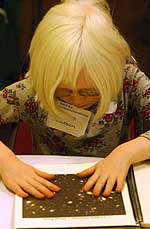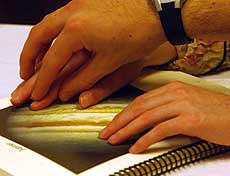Blind youths expand horizons
Convention offers astronomy lessons, baby-sitting class

BY MICHAEL HAYMAN, THE
C-J Catherine
Jacobson felt the bumps on a tactile photograph of stars.
|
Taking her granddaughter's right hand in her own, Beverly Martorana of Warren,
Mich., slowly ran it across a picture of Jupiter. "That's Jupiter. Can you feel it? That's what it looks like," Martorana
said, as Rebecca Budney's fingers moved cautiously across the picture's bumpy
surface, eventually finding the planet's great red spot. Later, the 8-year-old held a scale cutout of Mars that allowed
her to compare its size to the rest of the planets in the solar system.
"That's a teeny tiny one," she said. The astronomy lesson was among several activities organized yesterday
at the Galt House by the National Organization of Parents of Blind Children,
the parental division of the National Federation of the Blind, which is holding
its annual convention in Louisville.
The convention, which began yesterday and continues through Friday, is expected to attract more than 3,000 people.
|

BY MICHAEL HAYMAN, THE
COURIER-JOURNAL A
child's hand was guided over a tactile photograph of Jupiter.
Workshops were offered on aspects of space
exploration.
|
Based in Baltimore, Md., the federation represents more
than 50,000 blind and visually impaired people, parents of blind children
and others throughout the United States and Puerto Rico. Mark Riccobono, the federation's Wisconsin representative, said
the Parents of Blind Children is always looking to offer new experiences
that society often thinks are beyond blind children's capabilities. "That's kind of the goal, to say, `No. These are really things
you can do, and don't let the attitude that you can't do it stop you from
trying,'" he said. Last year, the focus was on recreational activities, and youths
had the opportunity to try origami paper art and cooking, and to take part
in a tug of war and sack races. This year, the organization turned its attention to space exploration,
bringing in Noreen Grice from the Boston Science Museum and Bernhard Beck-Winchatz,
a DePaul University professor and astronomer, to run workshops covering topics
from the solar system to asteroids to the extinction of the dinosaurs.
During both workshops, children used tactile images taken by the Hubble telescope.
"The misconception is that you need to be able to look through a
telescope to do astronomy. The truth is that most of the interesting things
about space are viewed through telescopes that have electronic cameras hooked
up to them that detect infrared light," said Riccobono, who also is the director
of the Wisconsin Center for the Blind and Visually Impaired. "Even sighted
astronomers are not looking through the telescope and using their naked eye."
Grice, who has written two books with tactile pictures of the solar
system for blind children, also used basketballs, soda cans, string and paper
cutouts to help explain planet sizes and distances. Holding one of the larger cutouts close to her face, Catherine
Jacobson from Minnesota excitedly announced, "Jupiter is bigger than my head."
A smaller cutout of Pluto prompted the 8-year-old to compare it to "a hole punch."
Later, Grice unfolded a cutout as big as the table and draped it
over the children's heads like a tent. "A million Earths can fit inside the
sun," she said. Debra Baker, a teacher from Springfield, Ohio, who is blind, said
there has been a misconception that science was not something that can be
taught to blind children. "When I was growing up I didn't get to study that at all; that's
why it's so wonderful. It's wonderful that it's here for the kids now," Baker
said. Barbara Pierce, the federation's director of public information,
said that during the convention, the children and other blind participants
will have an opportunity to hear from scientists and engineers who are blind.
"Most of us really like to know that someone else has done it or is doing it," she said.
Yesterday's convention schedule also allowed teenagers to learn
babysitting skills. Participants learned about safety, food preparation
and craft projects they can do with children. Riccobono said blind teenagers often do not gain the experience
that their sighted peers do of holding down jobs, like baby-sitting, that
help build confidence and teach responsibility.
Ultimately, he said, that contributes to a more than 70 percent unemployment rate among working-age blind people.
"It hurts them in the long run because they don't have work experience,
no matter how small," he said. "Those jobs are critical to opening the door
to other jobs."
^^ Back to top
| 



